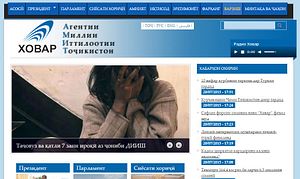Tajikistan’s small number of independent news sites are raising the warning flag with regard to a new government decree which directs all government departments to release information only to the state news agency, Khovar. Though far from having a free press, the Central Asian country does have a handful of independent news sites and private press agencies, in addition to journalists residing in the country. Central Asia is consistently placed at the bottom of international rankings for press freedom. The head of the National Association of Independent Media of Tajikistan, Nuriddin Karshiboev, says the new decree violates the country’s constitution, which provides for freedom of the press and equal right to information.
On July 13, Asia Plus reported that Tajik independent media outlets “have been faced with problems regarding coverage of activities of government bodies lately.” The report also says that sources at some government bodies say they’ve been instructed to give information only to Khovar, and that other media outlets must reference Khovar for the information. Tojnews reported last month that its reporters were having trouble getting information out of local officials, who cited a new rule instructing them to only give information to Khovar.
According to Interfax, the directive applies to information about government meetings, the President–including both domestic and international trips–as well as meetings and events domestic and abroad that are attended by Tajik delegations. The implication is worrying–all information about the government is to be funneled through a state mouthpiece, only. Rather than allowing independent press to determine what is newsworthy, the state is setting itself up to decide.
Abdulfattoh Shafiev wrote recently in GlobalVoices that “State media in post-Soviet Central Asian countries like Tajikistan focuses mostly on good news internally — however local — and bad news from abroad that serves to remind Tajiks how lucky they are to live in a stable autocracy.”
Khovar, of late, has been dedicated to an “information war” on ISIS. RFE/RL’s Tajik service reported earlier this month that the head of the state news agency, Zarobiddin Kosimi, said Khovar was “‘trying to make a greater contribution to the information war’ by making citizens aware of the ‘inhumane acts’ perpetrated by IS.”
That information war also extends to Tajikistan’s all-but-dead Islamic party–the Islamic Renaissance Party of Tajikistan (IRPT). Among the English content at Khovar, what appears to be an op-ed was published recently between a pair of press releases relating to President Emomali Rahmon’s recent visit to Rogon. The article lambastes the IRPT, especially its self-exiled leader Muhiddin Kabiri. The article also tacitly links the IRPT and ISIS, saying that after ISIS atrocities the IRPT kept a “friendly silence.”
The Tajik state seems to be engaging in an orchestrated campaign to condense the country’s media space, narrow avenues for legitimate political dissention and tamp down expressions of Islam. The short-term gain–perceived greater control–may spark future instability. Shafiev makes an astute observation that if the media is unable to filter real news from state propaganda or gossip, “the space for potentially dangerous misinformation will only grow.”

































